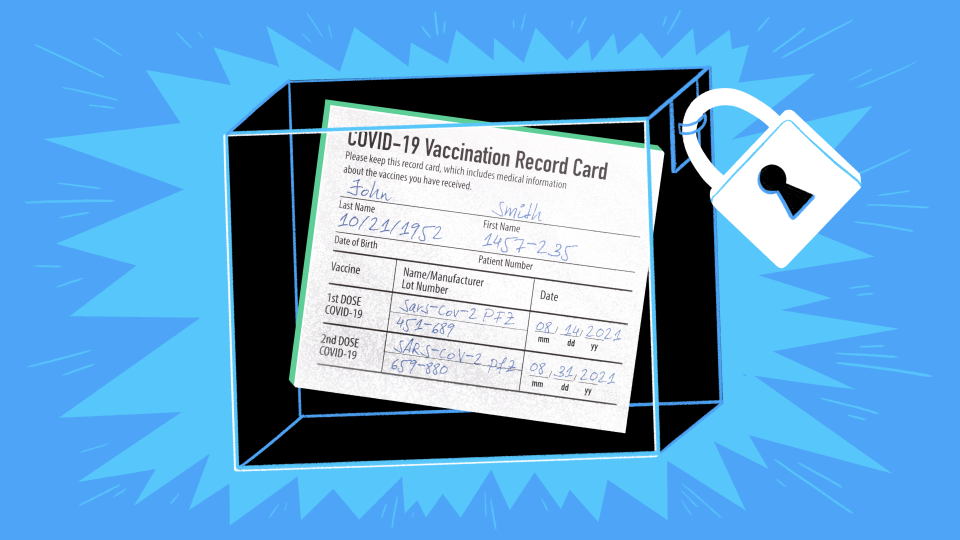Got your COVID-19 vaccine card? These archivists know how to keep it safe

— Recommendations are independently chosen by Reviewed’s editors. Purchases you make through our links may earn us a commission.
After a year of so much uncertainty, many people are eager to get their hands on the coveted white slip of paper that proves they had their COVID-19 immunization. As things begin to open back up, some weigh implementing vaccine passports and mandates, which would make proof of vaccination not only important, but required.
Get expert shopping advice delivered to your phone. Sign up for text message alerts from the deal-hunting nerds at Reviewed.
So what do you do, once you’re finally vaccinated and possess the 3-inch by 4-inch. The Centers for Disease Control and Prevention says to keep it in case you need it to document subsequent doses. It also recommends taking a photo of your card as a backup. Many people already have taken photos and posted their vaccine cards on social media—a practice the Federal Trade Commission advises against—as it can increase risk for identity theft. Another option is to use a scanner to preserve a digital copy that’s easy to access when you’re on-the-go.
Related: Masks still required for now at Walgreens, Kroger and more as retailers review new CDC mask guidance
Staples will laminate vaccine cards for free, but some archivists and conservators warn that laminating the card could damage it, as well as render it useless to update the information if needed.

William Bennett, a conservator at the Smithsonian Institution Archives, said that lamination was a “potential hazard” to the cards, and that if the card was marked by hand or with a printed label was also a factor to consider when preserving COVID-19 vaccination cards. “Inks can blur, bleed and discolor inside lamination because of the heat involved in the process and the chemical changes that occur in plastics over time. The potential for needing booster shots also makes it less practical, as new information can’t be added to the laminated card,” he said.
The National Archives offered its guidance on how to properly protect the card in a statement: “We recommend a plastic pocket (flexible or stiff) or a stiff paper envelope for the long-term storage of a vaccination card. The pocket should be big enough to fit the 3-inch by 4-inch card. The card is a bit too big for wallets, so we think it would be best if you keep it separate from your wallet; don't fold it.”
Amanda Richards, a preservation technician at the University of Tennessee Knoxville, has worked in the archiving field since 2011.
FYI
Please DO NOT laminate your vaccine cards.
1) You may need to add more info later
2) Heat lamination will turn thermal printed stickers black and you won't be able to read the info on your card
3) Laminate is evil
Just place it in a plastic or paper sleeve. pic.twitter.com/DxRv5TnBsc— Amanda Richards 🍸 (@ConserveItAll) March 31, 2021
Richards says, in her professional opinion, “I would recommend just pushing it in a plastic sleeve, much like a conference badge holder or a specialty waterproof one you can purchase online. I don't think you need to add more stress on your plate worrying about getting the perfect preservation solution but rather do what works for you, your budget, and your sanity.” For some, lamination may be the easiest option. She also adds, “My very standard preservation advice applies here as well as to your personal treasures. Keep your card out of direct sunlight and don't store it in the basement, attic or car (avoid damp areas and areas that have drastic temperature changes throughout the year.”
In place of lamination, waterproof and re-sealable protective sleeves can offer safer transport, and a layer of protection, rather than carrying around a free slip of paper or shoving it into a wallet. These card holders can be found at office supply stores and online retailers like Amazon.
Once you’ve got a protective case, if you want to add personal flair, try styling it with a lanyard that tells the world you’re vaccinated or throw it into a stylish vaccination-card-holder.
An alternative could be that you laminate a copy of your card, and keep the original in a safe place. The National Archives has tips for preserving important family papers, which include storing them in places with lower temperatures and keeping away from water to prevent damage.
Currently in the United States, 66.1 million—19.9% of the population—received COVID-19 vaccines. In the coming months as more line up to get their shots, securing and protecting that card will be important for things to reopen.
Need help finding products? Sign up for our weekly newsletter. It’s free and you can unsubscribe at any time.
The product experts at Reviewed have all your shopping needs covered. Follow Reviewed on Facebook, Twitter, Instagram and TikTok for the latest deals, reviews, and more.
Prices were accurate at the time this article was published but may change over time.
This article originally appeared on Reviewed: Covid-19 vaccine card: Protect it by laminating, card holders, photos

 Yahoo Finance
Yahoo Finance 